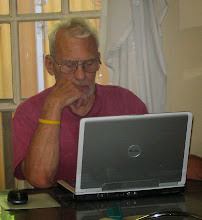April 11. Another sad memory.
It was 61 years ago when President Harry S. Truman relieved General Douglas MacArthur of Command of all U.S. Forces in Korea. One of those brushed-off presidential actions which, in my opinion, unleashed an immeasurable dose of death and suffering to a countless number of souls, along with an uncountable amount of treasure.
To recap, at an historic February, 1944 meeting at Yalta, the Soviet Union was awarded administrative control of all of the Korean Peninsula north of the 38th parallel. The Soviets had done nothing to wrest control of Korea from the Japanese and had no business on the peninsula. But at the Yalta meeting, President Roosevelt, senile and ill, sat nodding and drooling as Joseph Stalin demanded control of half of Korea and was granted his wish. He subsequently did nothing but install a puppet Communist Korean dictator and walk away.
In June of 1950 American forces in Korea were purely administrative, there to help the Koreans establish an independent government. I had friends among them, and they could hardly have been considered a fighting force. Out of the blue, the North Koreans crossed that 38th parallel and began driving American forces southward toward the sea.
General MacArthur, perhaps the most brilliant military mind in American history, readied a force and swept across Korea's middle, trapping North Korean forces to their south.With the Korean Army now largely prisoners, American forces then turned north driving their way to the Chinese border. As they neared the Yalu River, which formed that border, Chinese aircraft began attacking American forces in Korea.
The Chinese were weak at that time, their armies poorly trained and poorly armed. Their air force consisted largely of donated Soviet planes. MacArthur wanted to attack the Chinese air bases from which the attacks were launched and end that mischief decisively. President Truman feared that action would provoke a restart of recently concluded World War II and fired MacArthur.
Soon, Chinese ground troops swept across the border by the tens of thousands. Some of my friends there at the time had thought the war was over. Then, one morning their arose a terrible racket as Chinese troops pushed southward. One of my friends, a Marine infantryman, said many among the swarms of Chinese were armed with primitive weaponry. Many thousands were killed, but if you have ever tried to fight off a swarm of thousands of angry hornets, you can understand how they eventually overran the Americans.
American forces were able to take a firm stand at the old 38th parallel border - where it had all begun - and halted the Chinese-Korean advance, but the Americans were ordered to hold at that line. In 1952, General Dwight Eisenhower was elected president. Even before inauguration, he traveled to Korea and brokered a cease-fire, which brings us forward to April 11, 2012, the 61st anniversary of Mr. Truman's change of command in Korea. The cease fire is holding - sort of - but the war never ended.
Imagine, if you will that MacArthur had been given a free hand. A decisive and brutal blow at Chinese air bases north of the Yalu River would have undoubtedly stemmed the Chinese desire to fight for the puppet government in North Korea. After all, the Americans had been fighting for the Chinese to drive Japanese occupiers from their land since the late 1930s. Would not many Chinese have held a favorable enough opinion of Americans to dilute their taste for war over a neighbor which had contributed nothing to the Chinese?
Now, North Korea is militarily much stronger, and today or tomorrow threatens to launch a missile which, presumably, could reach the American mainland. We may shoot it out of the sky... if our current president, like Harry Truman in 1951, doesn't tremble in fear of starting a larger conflict. But think how much more easily we could have attacked some small Chinese air fields six decades ago. Think, too, how North Korean citizens, like their countrymen south of the 38th parallel could have prospered for three generations, instead of having watched their children starve.
